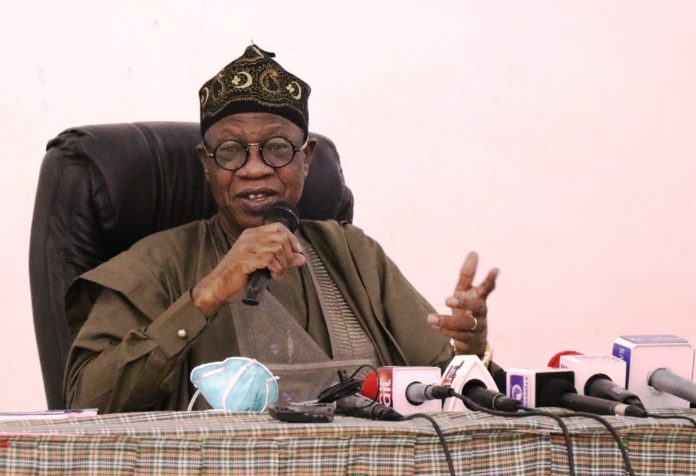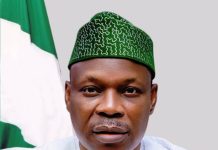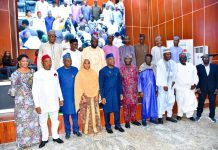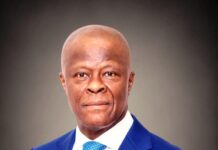Being The Text of The Press Conference Addressed By The Honourable Minister of Information and Culture, Alhaji Lai Mohammed, To Mark The First Anniversary (Second Term) of The Buhari Administration….in Abuja on Friday, 29 May 2020
Good morning gentlemen, and thank you for honouring our invitation to this press conference. It’s been a while. Of course, the Covid-19 pandemic has left us all either locked down or engaging in social distancing and avoiding mass gathering, as part of the overall safety and survival strategy in the face of the virulent virus that has taken the world by storm. I urge you all to continue to stay safe.
2. As you are all aware, today marks the first anniversary of the second term of the Administration of President Muhammadu Buhari. The entire media space in the country, and elsewhere around the world, has been taken over by the news of the Covid-19 pandemic. But we must also not lose sight of the fact that life continues, and that – despite devoting huge time and resources to combat the pandemic – the government has continued to function.
3. Gentlemen, the past one year has been momentous for Nigeria, as the President has taken some actions, mostly bold and highly visionary, that have now put Nigeria on an irreversible road to sustainable development. Never in the history of Nigeria have so many positive steps been taken in so short a time as Mr. President has done in the past one year.
POWER SUPPLY
4. Top on the list is power, or electricity if you wish. It will be an understatement to say that inadequate power supply, hallmarked by regularly blackouts, has stifled Nigeria’s economic development. It is perhaps the single most formidable obstacle to the country’s economic development. But, following an agreement with German company Siemens in July 2019 to boost power supply in Nigeria, the stage is set for the perennial power problem to become a thing of the past. Under the three-phase agreement, Nigerians will enjoy 7,000 megawatts of reliable power supply by the end of 2021 (phase 1), 11,000 megawatts by the end of 2023 (phase 2) and 25,000 megawatts in the third phase.
To put things in perspective, Nigeria’s current power generation capacity is more than 13,000 megawatts, but only an average of 3,400 megawatts reliably reach consumers. In essence, the current amount of power that reaches consumers will more than double by the end of next year. In addition, this will create thousands of jobs and wil leapfrog the country into the next level of industrial and social development.
5. This is how Mr. President sums up the agreement: “Our goal is simply to deliver electricity to Nigerian businesses and homes. My challenge to Siemens, our partner investors in the distribution companies, the Transmission Company of Nigeria and the electricity regulator, is to work hard to achieve 7,000 megawatts of reliable power supply by 2021 and 11,000 megawatts by 2023 – in phases 1 and 2 respectively. After these transmission and distribution system bottlenecks have been fixed, we will seek – in the third and final phase – to drive generation capacity and overall grid capacity to 25,000 megawatts.”
BORDER DRILL/EXERCISE SWIFT RESPONSE
6. Shortly after Mr. President took a definitive step to ensure stable power supply for Nigeria in the shortest possible time, he also took another bold step to put Nigeria on the path to food sufficiency, stem the flow of illicit arms into the country and improve national security. Mr. President did this by ordering a border drill (which many have called border closure) as part of measures to secure Nigeria’s land and maritime borders. The border drill, code-named EXERCISE SWIFT RESPONSE, involves the Nigerian Customs Service (NCS) and Nigerian Immigration Service (NIS), in collaboration with the Armed Forces of Nigeria (AFN) as well as the Nigeria Police Force (NPF) and other security and intelligence agencies. The drill is being coordinated by the Office of the National Security Adviser (ONSA).
7. Gentlemen, by that singular bold move by Mr. President, Nigeria has achieved the following:
– FOOD SUFFICIENCY: The border closure has boosted production of agricultural products especially local rice, tomatoes, pepper and poultry; and this has influenced the growth of the economy positively.
Today, Nigeria is fast attaining self sufficiency in rice production, as the border drill has drastically reduced rice smuggling into the country and catalyzed rice production by farmers across the country.
Now, Nigeria has over 34 integrated rice mills as well as rice clusters, while millions of direct and indirect jobs have been created, and huge amount in foreign exchange, that hitherto went into rice importation, conserved. Rice cultivation has increased from two to three times a year, while rice farmers are now venturing beyond rice cultivation to milling, packaging and marketing.
Overall, the integrated mills currently produce 150,000 bags of rice daily and about 35 million bags per annum, as at the last time we checked.
– REDUCED SMUGGLING: While the border drill has curbed the smuggling of rice and other prohibited items into the country, it has also led to significant seizures with estimated monetary value of close to 10 billion Naira, reduced local fuel consumption by 30% and reduced the importation of arms, munitions and drugs.
– ENHANCED SECURITY: The drill has made it more difficult for terrorists and other criminals to procure arms and ammunition while criminal elements no longer make their way into the country through the land borders. The implication is that we have witnessed a reduction in cases of insecurity – kidnapping, banditry, armed robbery or other violent crimes. The border closure has drastically reduced availability of hard drugs on the streets, as well as curbed activities of armed smugglers. Talking about security, you are all aware of the unprecedented successes being recorded every day by our gallant troops against the insurgents in the North-east. We must continue to support our troops as they clear the remnants of the insurgents.
– INCREASED REVENUE: From 4.5 billion Naira daily before the drill, the Nigeria Customs Service raised its daily revenue to between N5 billion and N8 billion daily, before the Covid-19 pandemic lock down which has, of course, impacted revenue collection.
– REDUCTION IN ILLEGAL MIGRATION: This has reduced drastically.
– IMPROVED INTER-AGENCY COLLABORATION: The exercise has also provided a unique platform for the participating agencies to operate jointly, thereby strengthening inter-agency collaboration and reducing animosity.
NEW VISA POLICY
8. Confirming the ‘Next Level’ dictum of the Administration, President Buhari continued his string of bold and innovative initiatives by launching a new visa policy for Nigeria in February
2020. At the launch of The Nigeria Visa Policy (NVP) 2020, Mr. President said and I quote: “This new Visa Policy will advance our goal of building a globally-competitive economy, by helping attract Innovation and specialized skills and knowledge from abroad, to complement locally available ones. We are sending a message to the world that Nigeria is open for business.” End of Quote. The NVP will also improve Nigeria’s business environment, attract Foreign Direct Investment, boost tourism, and improve African integration, without compromising national security and our territorial integrity.
Highlights of the new visa policy, which has 79 categories, include the first category for ECOWAS citizens who can enter the country without visa; the second category for African citizens with African passport, from any part of the world, who can travel to Nigeria and obtain visa at the port of entry; the third category consists of frequent business travellers, while the
fourth category consists of those who want to take residence, either temporarily or long term. This policy is aimed at simplifying processes and making Nigeria the preferred investment and tourism destination.
INFRASTRUCTURAL DEVELOPMENT
9. During my 2019 year-ending press conference, I said if there is any area in which this Administration has been consistent in terms of development, it is in the area of building and revamping critical infrastructure. That statement holds true today as it was then.
Gentlemen, as you are aware, this Administration has embarked on a massive infrastructural renewal, the type of which the country has not witnessed since Nigeria’s return to democratic rule in 1999. The Administration has embarked on infrastructural projects – roads, bridges, rail, power, etc – in all the six geo-political zones. The Covid-19 pandemic may have briefly slowed down activities in this sector, but work is set to resume in over 50 infrastructure projects spread across 26 states. These include major projects like the Second Niger Bridge, Abuja-Kano Expressway, the Owerri Interchange, Lagos-Ibadan Expressway and Port Harcourt-Enugu Expressway. Similarly, all is set for the commencement of road repairs in 92 locations across 24 states by the Federal Roads Maintenance Agency (FERMA). Work has also continued on the laying of rail tracks on the Lagos-Ibadan Standard Gauge rail line, which has already commenced test-run.
JOB CREATION
10. While the N-Power Programme to empower Nigerian youths and create jobs is continuing, the Administration took another great step with the inauguration of the Committee for the pilot special public works programme, to be implemented by the National Directorate for Employment (NDE) in five Local Governments. In the wake of the Covid-19 pandemic, President Buhari has approved the engagement of 774,000 Nigerians for Special Public Works programme in the country to cushion the effect of the pandemic. Under the programme, the 774,000 Nigerians will be engaged for a period of three months, with a payment of N20,000 monthly allowance to each beneficiary
FIGHT AGAINST CORRUPTION
11. The fight against corruption, a cardinal programme of the Administration, continued unabated during the period under review. The leading anti-corruption agencies have been unrelenting in facing down the canker worm of corruption. In the last one year alone, the Independent Corrupt Practices and Other Offences Commission (ICPC) has recovered assets worth 81.23 billion Naira
The breakdown are as follows:
– N 41.98bn — Money restrained on review of MDAs’ Personnel Cost Expenditure and Capital Development Fund
– N35.011bn — Lands, Buildings & Vehicles
-. N1.167bn — Cash in TSA
– N0.77bn — Recoveries from Constituency projects tracked
– N 1.097bn — Completed constituency projects on return of contractors to site
– N 0.865bn — Cash (Other Accounts)
– $1.113m — Cash (Other Domiciliary A/C) Converted @ N305/ $
The ICPC has also established a Constituency Project Tracking Group, now named Constituency and Executive Projects Tracking Group, to track performance of publicly-funded projects, especially projects with immediate impact on the livelihood of ordinary Nigerians. 424 of such projects were tracked within the period under review, which led to the completion of several abandoned projects and recovery of billions of Naira on some of the projects. Number of completed constituency projects in education, health, water resources, agriculture and other sectors increased to over 400 nationwide, from those that were specifically monitored. Furthermore, over 300 contractors who had abandoned projects returned to site in various parts of the country.
In the area of prosecution, the Commission secured 25 convictions in the past one year. The Commission received 1934 petitions within the period under review and concluded investigations on 588 petitions. 105 cases were filed in court and 25 convictions were secured.
The ICPC has also escalated the use of administrative sanctions in the public service by periodically submitting, for sanction, names of public servants being prosecuted, in line with extant public service rules. 62 names were submitted to government for sanction in 2019.
On its prevention mandate, the Commission reviewed the personnel and capital fund expenditure of 201 MDAs. This activity led to the restraining of about N42 billion on inflated personnel cost which would otherwise have been diverted by MDAs mostly in health and education sectors.
EFCC
For its part, the Economic and Financial Crimes Commission (EFCC) has secured 1,270 convictions and recovered huge amounts of money within the period under review. The recoveries include 32.6 billion Naira; $10,348; 758,155 Pounds Sterling; 183,475 Euros; 294,950 Saudi Riyal; 2,800 Chinese Yuan; 300 Canadian Dollars and 500 CFA.
The 1,270 convictions include high profile ones, such as the liquidation and forfeiture of the P&ID Nigeria Limited to the Federal Government, after the conviction of the company for fraud and tax evasion.
EXECUTIVE ORDER
12. On May 22nd 2020, President Muhammadu Buhari took yet another bold step, this time on the implementation of financial autonomy of the state legislature and judiciary, by signing Executive Order Number 10 of 2020. This decision will strengthen the institutions at the state level and make them more independent and accountable in line with the tenets of democracy, as enshrined in the Constitution of the Federal Republic of Nigeria 1999 (as Amended). Executive Order 10 also gives fillip to the separation of powers, a fundamental principle of government, and strengthens the system of checks and balances.
COVID-19 PANDEMIC
13. In his broadcast to the nation on Sunday, 29 March 2020, President Buhari said, inter alia: ”In Nigeria’s fight against Covid-19, there is no such thing as an overreaction or under-reaction. It is all about the right reaction by the right agencies and trained experts.” This best summarizes the handling of the pandemic by the Federal Government.
It is important to note that, but for the right reaction by the Administration, the situation as it is today could have been worse. Just look around Africa to see what we are saying. Countries with a quarter of Nigeria’s population and supposedly better healthcare systems have considerably higher number of cases and deaths. The Administration is not happy that Nigeria has even recorded a single case of Covid-19 or a single death, but the figures we have today could have been much worse, but for a series of proactive actions and the right leadership by Mr. President.
Gentlemen, one month before the first case of Covid-19 was recorded in Nigeria, the Federal Government had already announced it was strengthening surveillance at the nation’s gateway international airports to prevent the spread of the virus. By 31 Jan. 2020, the Federal Government had set up a Coronavirus Preparedness Group to mitigate the impact of the virus if it eventually spreads to the country. By March 9, just a little over a week after the country’s index case, President Buhari established the Presidential Task Force for Covid-19. The Task Force immediately swung into action, banning travellers from 15 countries, with over 1,000 cases of the virus, from entering Nigeria, followed by the closure of all international
airports. Other actions include the indefinite suspension of Federal Executive Council (FEC) and National Council of State (NCS) meetings, release of 10 Billion Naira to Lagos State and 5 billion Naira special intervention fund to the NCDC to equip, expand and provide personnel to its facilities and laboratories across the country. Mr. President also directed the Minister of Industry, Trade and Investment, to work with the Manufacturers Association of Nigeria (MAN) to ensure that production of essential items such as food, medical and pharmaceutical
products continues. By March 29, the President made a national broadcast locking down the epicentre of the disease in Nigeria, Lagos state; as well as Ogun State and the Federal Capital Territory for 14 days in the first instance, while also ordering the provision of palliatives to vulnerable groups, including those receiving conditional cash transfer and school children.
Gentlemen, the impressive leadership provided by the President in the fight against Covid-19 led to his appointment as the Champion of the Covid-19 response by the Presidents of West African countries under the aegis of ECOWAS Authority of Heads of State and Government. Recall that Nigeria was the first African nation to publish the genome sequence of Covid-19, which is critical to understanding the virus and to the development of a vaccine against it. This action attracted the commendation of the World Health Organization (WHO), just like Nigeria’s response to the Covid-19 pandemic caught the attention of UN Secretary-General António Guterres, who hailed it as remarkable. The PTF has continued to formulate and implement the nation’s strategy to checkmate the rampaging virus and keep Nigerians safe. The number of molecular laboratories in the country has been increased from 5 to 28 under three months, making it possible to increase the number of Covid-19 tests.
The goal is to have at least one laboratory in each state of the federation.
Also, more than 10,000 health workers have been trained since the pandemic broke. We salute the patriotism and sacrifice of our healthcare workers, security personnel as well as all frontline workers. We also appreciate the contributions of CACOVID, the Oil and Gas Group led by the NNPC, and the UN family It’s a major achievement that we have prevented the virus from overwhelming our health system, despite all odds.
CONCLUSION
President Muhammadu Buhari was elected in 2015 on the strength of his promise of change. Nigerians, who are satisfied with his performance, especially in the cardinal areas of fighting corruption, tackling insecurity and revamping the economy, overwhelmingly re-elected the President in 2019. One year later, the President is taking Nigeria to the Next Level of irreversible change for the better.
The intractable power problem is finally being tackled in a way that will end poor power supply that has stunted Nigeria’s socio-economic development. The days of unbridled massive importation of food are coming to an end, as Nigeria moves to become self-sufficient in major staples, especially rice. Thanks to the provision of many platforms and improved welfare, the Nigerian military is living up to the billing in tackling.insurgency.
With the bold and courageous leadership provided by President Buhari, Nigeria is marching surely and steadily to join the comity of great nations. Change is never easy, and the birth of a new nation comes with pain. We thank Nigerians for their support and perseverance, an hereby reassure them of the Administration’s unrelenting commitment to making life more meaningful for the citizenry.
As we begin the second year of the second and last tenure of President Muhammadu Buhari, I want to inform Nigerians that the stage is set for the implementation of the greatest agricultural revolution in the history of Nigeria. The unprecedented recent approval by the Buhari administration to inject $1.2b in in-kind loan into the agriculture sector through the government-to-government bilateral loan from Brazil, with support from Deutsche Bank and the Islamic Corporation for Insurance of Export Credit of the Islamic Development Bank, will revolutionize our agriculture at scale. Together with the Hon. Minister of Agriculture and Rural Development, we will be briefing Nigerians on this project in the days ahead.
I thank you for your kind attention






